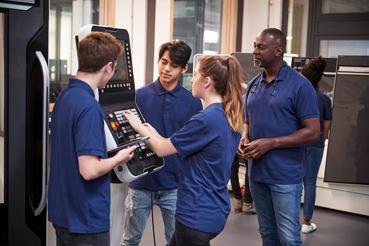Bolstering Workforce Pathways at City Colleges of Chicago

The promise of shorter-term, sector-focused workforce training programs has become a growing area of interest in community colleges. However, research on how to build more effective pathways has been limited and more needs to be learned about how to grow and strengthen these workforce-oriented practices in community colleges.
To address this need, AIR partnered with the City Colleges of Chicago (CCC) to research and provide technical assistance to strengthen its sector-focused Centers of Excellence (COE), which provide training in high-demand fields across its seven colleges. Students’ equitable access and success in these programs have also been critical areas of focus.
Working Together to Strengthen the Model
The partnership work between CCC and AIR began with a formative qualitative and quantitative investigation into the COE model implementation across the district, which informed AIR’s technical assistance approach. The findings suggested that many core aspects of the model had not yet been institutionalized and implementation varied across the sectors and colleges. Additionally, it was noted that significant enrollment and completion gaps existed by race, ethnicity, and gender across the centers.
AIR launched several technical assistance efforts based on these findings in 2022. More specifically, AIR and CCC focused on:
- Developing a more specific and actionable framework and guidance for overall COE structure and implementation;
- Analyzing current labor market trends to assess COE programming and alignment with industry needs;
- Creating supports for effective employer engagement, tracking, and coordination;
- Establishing districtwide guidance and requirements for implementing work-based learning;
- Developing measures and tools to more readily assess COE enrollments and performance; and
- Undertaking qualitative and quantitative research to gather student perspectives on COE programming and to assess equity issues in COE access for different racial and ethnic communities in the Chicago area.
Key Findings
- District and college leadership, faculty, and staff were passionate about student academic and career success and eager to see quality labor market outcomes.
- Many college leaders had questions about the expectations, measures of accountability, and supports associated with successful district-wide COE implementation.
- Many of the COE model’s key aspects had not been fully institutionalized across the district.
- Access and enrollments varied across COEs and significant enrollment and completion gaps existed by race, ethnicity, and gender across programs and colleges.
- A multi-pronged approach to strengthening multiple aspects of the COE model could support the implementation and expansion of this work across the district and provide structure and consistency.
Framework and Deliverables
- Centers of Excellence Playbook 2024. This resource establishes a common framework for COE implementation that focuses on four key elements, with sub-elements and actionable implementation guidance.
- Leadership and vision
- Industry engagement and curriculum alignment
- Equitable student access, recruitment, and outcomes
- Measurement, assessment, and continuous improvement
- Work-Based Learning Implementation Guidance. The purpose of this guidebook is to articulate the minimum expectations that promote rigor and consistency in how WBL opportunities are offered to students across City Colleges of Chicago.
- Strategic Employer Engagement Desk Aid. This resource focuses on high-level strategies and tips for understanding industry opportunity and enhancing student outcomes through relationship development and sustained employer partnership.
- Additional tools for assessing and measuring success; implementing strong employer engagement, coordination, and support; streamlining use of customer relationship management (CRM) tools; and analyzing and using labor market data to make informed decisions about programming and student supports.
AIR’s aim from its work with CCC is to share lessons with the field about the successes and challenges of building more systematic approaches to workforce training in community college settings.
The PROMISE Center is directly supported by the AIR Equity Initiative, AIR’s $100+ million five-year investment to advance equity in several important areas: workforce development, education, public safety and policing, and health. The AIR Equity Initiative is committed to investing in the generation and use of high-quality evidence that address the harmful effects of segregation by race and place.

